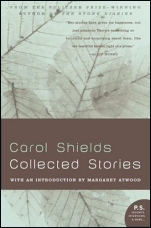 |












|

|
Collected Stories
2004

In Collected Stories,
readers can enjoy all of Carol Shields' remarkable short
story collections - Various
Miracles (1985), The
Orange Fish (1989) and Dressing
Up for the Carnival (2000) - in one volume along
with her last, previously unpublished, story, "Segue".
In these stories she combines the
dazzling virtuosity and wise maturity that won so many
readers to her prize-winning novels. Playful, charming,
acutely observed and generous of spirit, this collection
of 56 stories will delight and enchant readers.
 Buy
the Book Buy
the Book
Click
here to order.
 |
Carol Shields's short stories have
given me happiness, not just pleasure. They're prismatic;
they delight at first by the clear and simple elegance
with which they are made, then there is something so
bountiful and surprising, like beautiful broken lights."
- Alice Munro
|
 |
Segue is, as one would expect,
a masterful and engaging piece of writing, and happily
it works almost as well as a short story as it would
have had circumstances permitted it to be the beginning
of a longer, finished project…. With the arrival on
the shelves of this handsomely designed and important
collection, we her readers can experience once again
the privilege of stepping into Carol Shields's brilliantly
rendered, many-faceted world with all its dramatic contrasts
of private light and darkness."
- The Globe
and Mail
|
 |
Playful, charming, acutely observed
and generous of spirit, this collection of stories will
delight and enchant Carol Shields fans everywhere."
- randomhouse.ca
|
 Reviews Reviews
Collected Stories of Carol
Shields reviewed by Clara Thomas
Books in Canada
Carol Shields's Collected Stories
was published, with the cooperation of her family, one
year after her death. "Segue", a chapter from the novel
she was working on when she died, is included along with
the complete collections, Various Miracles, The
Orange Fish and Dressing up for the Carnival.
Her daughters Anne and Sara were actively engaged in the
book's preparation and made themselves available for interviews.
The finished work is a handsome collection, her family's
memorial to the writer whose remarkably diverse talents
leave us a shining legacy. New readers as well as long-devoted
readers will be captivated by its largesse: we expect
from Shields a large generosity, a questing intelligence,
an acute wit, an eye for the deceptively ordinary and
above all a constant word-enchantment; in these pages
we will not be disappointed. ...

 |
A radiant gift, a brilliant archive."
-Winnipeg
Free Press
|
 |
Every story in this collection is
a small, glittering masterpiece."
- National
Post
|
Home Truths
Collected Stories of Carol
Shields
reviewed by Laura Ciolkowski
The Washington Post
Sunday, March 6, 2005; Page BW07
Virginia Woolf knew how things would
be for a writer like the late Carol Shields, a housewife
and mother of five who published her first novel in 1976
at the age of 40, and performed the miraculous magic trick
of writing fiction from within the elusive open spaces
of her harried and overflowing domestic world. In a literary
climate in which the minutiae of daily life are too frequently
seen as a distraction rather than as the raw material
for fiction, a so-called miniaturist like Shields, Woolf
understood, would be written off as a lightweight, mired
in the trivialities that great writers ostensibly must
overcome. Woolf mocked the high-Victorian arbiters of
taste and the stuffy, patriarchal style-makers of her
time: "This is an important book, the critic assumes,
because it deals with war. This is an insignificant book
because it deals with the feelings of women in a drawing-room.
A scene in a battlefield is more important than a scene
in a shop -- everywhere and much more subtly the difference
of value persists."
Like Jane Austen, a master chronicler
of the depth and psychological weightiness of the apparently
ordinary world of women (and the subject of Shields's
prizewinning 2001 biography in the Penguin Lives series),
Shields was not able to dodge charges of a lack of literary
seriousness in her work, in spite of her impressive collection
of honors and prizes, including a Pulitzer, a National
Book Critics Circle Award and the Orange Prize for fiction.
The critics "said that I wrote 'women's books,' 'domestic
novels,' as if that were a lesser thing," she confessed
in an interview conducted just three years before her
death from cancer in July 2003. "But I knew then as I
know now that the lives of women are serious and interesting."
...

 |
No writer in the English-speaking
world has written more eloquent, witty and graceful
sentences than Carol Shields…. If the purpose of fiction
is to break up the frozen seas within us, as Kafka once
said, spending a few days in the company of Shields'
stories allowed me to re-experience the poignancy of
human life and, at the same time, its undeniable comedy,
its sensuality and beauty."
- Susan
Swan in National Post
|
 |
A grand gift for a true Shields
fan."
- Toronto
Star
|
 |
Intelligent, provocative and entertaining."
- The New
York Review of Books
|
'Collected Stories' : Woman
on the Edge
Collected Stories of Carol
Shields reviewed
by Ann Hulbert
New York Times
February 6, 2005
"Canadian women are on the
edge of the edge -- this has to give edge to voices.''
In the spring of 2002, a year before she died of breast
cancer, that was how Carol Shields celebrated the bracing
literary company she kept in her adopted country. For
male writers up north, she observed, there was no ''haunting
of the big cats: Hawthorne, Twain, Faulkner, Hemingway''
(whose birthplace was her own hometown, Oak Park, Ill.).
For Shields, surprised by the Pulitzer Prize for ''The
Stone Diaries,'' there was an invigorating sisterhood.
In Alice Munro, whose praise adorns the back cover of
this fat volume, and Margaret Atwood, who contributed
the introduction, she found birds of a feather. All born
in the 1930's, they took flight at their own pace, which
for Shields meant taking her time.
She was 40 in 1976 when her first
novel appeared, a housewife with five children and an
engineer husband whom she had married right out of college.
Over the next 16 years, she produced six novels and two
of the three collections of stories -- ''Various Miracles''
and ''Orange Fish'' -- in this omnibus edition; the third,
''Dressing Up for the Carnival,'' appeared in 2000. Her
trademark characters, kindly but confused souls making
their way in a land of ''people sugaring off and drinking
tea and casting for trout and nodding amicably,'' won
Shields a largely Canadian following. She also earned
a kindly reputation herself as a warm-hearted writer from
Winnipeg with a fondness for happy endings. ...

 |
Carol Shield’s short stories
are full of sentences you could almost sing...[her]
sentences transmute base metal into gold.”
- Independent
|
Reading beyond the fridge
magnets:
Carol Shields short stories
show depths some critics overlooked, says Hermione Lee
Collected Stories of Carol
Shields reviewed by Hermione
Lee
The Guardian
July 3, 2004
In the last years of her life, Carol Shields
went on working. She published a remarkable novel, Unless,
a volume of stories, and a short, sympathetic life of
Jane Austen. The biography dealt feelingly with the frustrations,
deprivations and solitude of a great woman writer with
no literary confidantes and a restrictive family life.
The novel gave the story of a woman writer of light novels,
whose daughter had run away from home to adopt an extremist
life of "goodness" - either of madness or sainthood. The
novelist, Reta Winters, was writing angry, unsent letters
about the exclusion and powerlessness of women. Reta had
already made an appearance in one of the late stories,
"A Scarf", in which she says, of herself and other women
writers, "Not one of us was going to get what we wanted."
The same phrase recurs in Unless.
These late themes forcibly suggested
that the tendency to celebrate Shields as a benign, tender,
mild observer of ordinary, minor lives has not made for
a perfect fit. There is a good deal of fury and resentment
in her work, and she can be sharp and bitter. ("In his
late forties he fell in love with another woman. Was she
younger than his wife? Yes, of course she was younger.")
She was a late-20th-century feminist who saw that women
(including women writers) are still being patronised and
minoritised all over the place. The very everydayness
and ordinariness she was so praised for attending to was
also what allowed her to be somewhat condescended to,
in spite of the prizes and the good reviews. ...

 |
Her perceptions
are so quick, her style is so acute, that she can
tack a breath to the page and skewer a thought on
the wing. It is her speciality to isolate the moments
that, because of some sensuous overkill they possess,
remain distinct in the mind for years, perhaps for
a lifetime." "
- Hilary
Mantel, Sunday Times
|
[ Buy
this book | Top ]
|
|
|
 |



